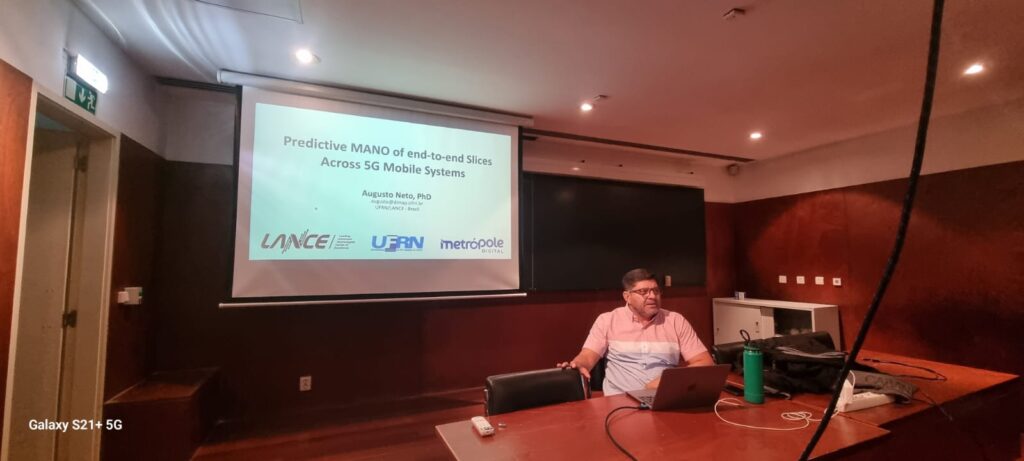The DL Tour of Prof. Augusto Neto finishes with a great success
After a successful Distinguished Lecture Tour of Professor Augusto José Venâncio Neto around Europe, he has shared with our chapter his impressions and a brief summary of the five DLs carried out:
“Overall impressions of my DLT
I am pleased to present this report on my recent Distinguished Lecturer Tour in Europe, which took place from May 10 to 18, 2024. During this tour, I had the opportunity to deliver lectures at several prestigious institutions and engage in valuable discussions with local researchers to explore potential collaborations and joint endeavours.
Summary of DLT talks
In this DLT, I delivered five talks, scheduled as follows:
- Talk 1 at University of Murcia, hosted by Prof. Antonio Skarmeta and Ramon Iborra, on 10 May, 2024
- Talk 2 at École d’Ingénieurs Généraliste du Numérique (EFREI), Paris, France. Hosted by Prof. Dario Vieira, on 13 May, 2024
- Talk 4 at University of Minho, Braga, Portugal. Hosted by Prof. Flávio Oliveira, on 16 May, 2024.
- Talk 3 at University of Aveiro, Aveiro, Portugal. Hosted by Prof. Susana Sargento, on 17 May 2024
- Talk 5 at Instituto de Telecomunicações, Aveiro, Portugal. Hosted by Prof. Daniel Corujo, on 17 May, 2024
The tour began at the University of Murcia in Spain, where I presented a lecture entitled “ Network Slicing: Concepts, Enabling Technologies, Use Cases, Challenges, and Opportunities“, along with the latest advancements in my research area. As Fig. 1 depicts, the event was well-attended, and I had the chance to interact with faculty members and students, discussing potential research synergies and student exchange opportunities. Moreover, prof. Ramon presented all 5G facilities in Univ. of Murcia, where we discussed about further collaborations harnessing our strong synergies.

Figure1: Lecture at the University of Murcia
Next, I travelled to Paris, France, to deliver a lecture at EFFREI. The audience was engaged and enthusiastic, and I received positive feedback on the content and delivery of my presentation, entitled “Predictive MANO of end-to-end Slices Across 5G Mobile Systems”. Following the lecture, I met with the university’s research team to discuss potential joint projects and the possibility of co-supervising student theses. Fig. 2 provides a snapshot of EFFEREI team members that prof. Dario Vieira heads.

Figure 2. EFFREI team members
The tour then took me to Portugal, where I visited the University of Aveiro and University of Minho (depicted at Fig. 3), presenting our LANCE (Leading Advanced Technologies Center of Excellence) facilities, research skills, and projects. At these institutions, I delivered lectures that were well-received by the faculty and students. These visits also provided opportunities for me to meet with local researchers and explore areas of common interest, such as joint publications, research projects, and student exchanges.

Figure 3. Lecture at University of Minho
My final stop was at the Instituto de Telecomunicações, also in Portugal. I had the chance to give a talk about “Cloud-Network Slicing: Concepts, Benefits, and Enablers”, and engage in discussions with the institute’s researchers. We identified several potential areas for collaboration, including joint project proposals and the exchange of researchers and students. Fig. 4 provides a view on my lecture at the Instituto de Telecomunicações.

Figure 3. Lecture at Instituto de Telecomunicações
Throughout the tour, I was able to establish new connections and strengthen existing ones with European researchers and institutions. These interactions have opened up exciting possibilities for future collaborations, such as joint publications, research projects, and student exchanges.
Extra talk activities
On 17 May, I had the privilege of delivering a lecture to the PhD class of “Communications and Autonomous Systems” at the University of Aveiro. The lecture, titled “Proactive Management and Orchestration of Network Slices”, covered harnessing edge computing capabilities along with machine learning techniques to enable proactive Management and Orchestration (MANO) for 5G network slices. At the end, experimental outcomes on predicted decision-making demands to optimize slice provisioning, scaling, and migration across Open RAN domains will be discussed. The audience consisted of PhD students and faculty members from the university’s Department of Electronics, Telecommunications and Informatics, and the discussion that followed the lecture was engaging and thought-provoking. I appreciated the opportunity to share my research expertise with the next generation of scholars in the field and to learn from their perspectives and insights.
My views on the DL program
My DLT in Europe was a resounding success. It allowed me to share my research with a wider audience, engage with local researchers, and explore new avenues for collaboration. I am confident that the connections made during this tour will lead to fruitful partnerships and contribute to the advancement of knowledge in our field. I strongly endorse the DL program for any researcher interested in expanding their horizons. I encourage every IEEE member to apply as it will greatly enhance their research career. Together, as a community of DLs, we can harness our combined expertise to drive innovation and advance our field to new heights.”
Professor Augusto José Venâncio Neto

